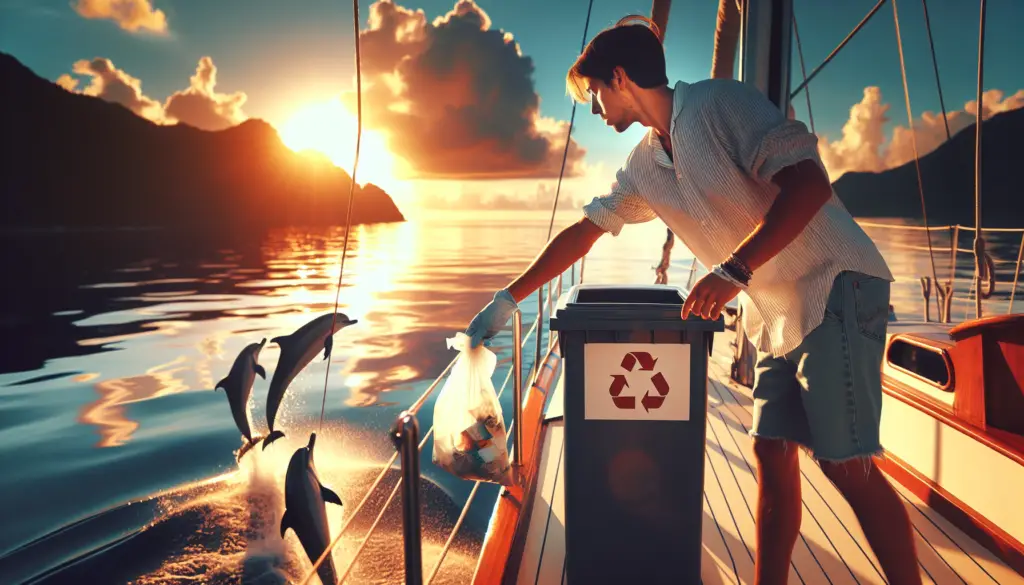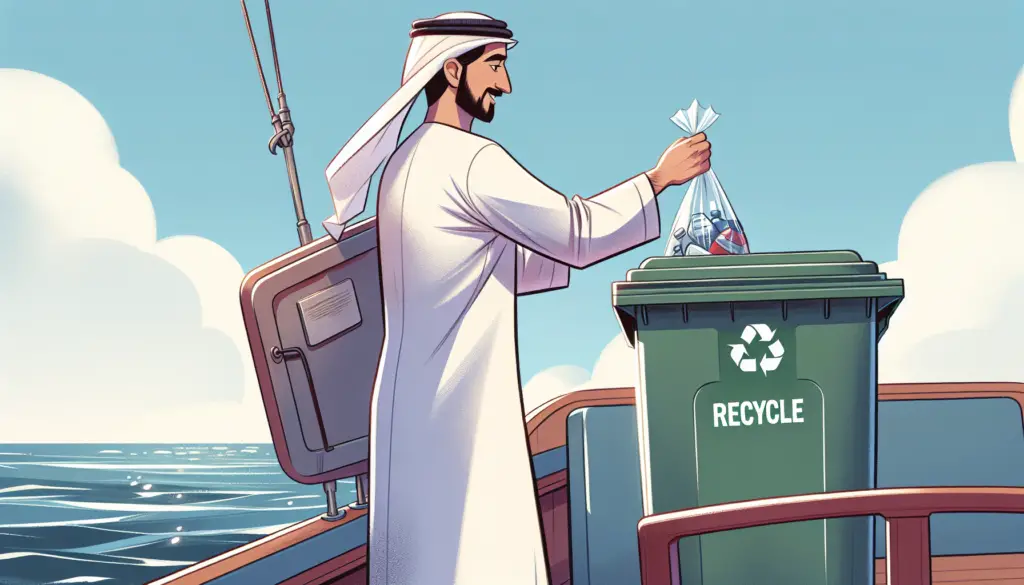Imagine setting sail on a sunny afternoon, the wind blowing through your hair as you glide effortlessly across the water. It’s the perfect way to unwind, isn’t it? But, as a boater, it’s your duty to preserve this wonderful environment for others to enjoy. The article, “Responsible Waste Management for Boaters,” shares crucial information, insights, and guidelines to help you reduce your environmental impact and uphold your commitment to responsible boating. It discusses best practices on solid waste disposal, treating and discharging water waste, and helpful habits for eco-conscious navigation. Good nautical stewardship is more than just enjoying the water; it’s about ensuring those waters remain unpolluted, vibrant and teeming with life for generations to come.

Understanding the Importance of Responsible Waste Management
As avid boaters, you have probably seen the beauty that the world’s water bodies have to offer firsthand. However, it’s important to understand that these often untouched ecosystems can be significantly impacted by irresponsible waste management. Waste that’s improperly disposed of can harm marine life, present significant health and safety risks, and have serious legal implications.
The impact of neglected waste management on marine life
Improper waste disposal devastates marine life. Unfortunately, it’s not rare to hear stories of entangled sea creatures or of plastic ingested by sea turtles, birds, and even whales. All types of waste, from plastic trash to hazardous chemicals, can damage, injure, or even kill marine wildlife. It also disrupts the food chain, impacting all living creatures in these ecosystems.
Health and safety risks associated with improper waste disposal
Negligent waste management is not only harmful to wildlife but also poses severe health risks. Floating debris could damage boats or lead to accidents. Moreover, polluted water can harbour harmful microorganisms causing waterborne diseases. People involved in water activities like swimming, fishing or scuba diving are directly exposed to these dangers.
Legal implications of irresponsible waste disposal
Irresponsible waste disposal on boats can also land you in hot water with the law. Most countries have regulations against disposing of waste into the marine environment. Non-compliance can result in hefty fines, suspension of boating licenses, or even jail time.
Types of Waste Generated on Boats
Understanding the types of waste generated on boats is an essential step towards responsible waste management. The main categories include sewage waste, solid waste, hazardous waste, and regulated garbage or food waste.
Sewage waste
Sewage consists of human bodily wastes or any other wash water originating from onboard sanitary facilities. Inappropriate disposal of sewage waste in marines poses a serious ecological threat, such as water pollution and the spread of harmful pathogens.
Solid waste
Solid waste on boats includes plastic bags, cans, bottles, paper, cardboard, aluminium foil and many more. When not disposed of correctly, solid waste often ends up in bodies of water, affecting marine life and the overall health of the ocean.
Hazardous waste
Hazardous waste usually consists of batteries, paints, solvents, oil, antifreeze, and cleaning products. Such substances are harmful not only to marine life but can also contaminate the water, rendering it unsafe for human consumption.
Regulated garbage or food waste
Food waste decomposes faster than most other kinds of waste, leading to enhanced bacterial and algal growth that disrupts the natural marine ecosystem.
Preventing Pollution from Boats
Prevention is undoubtedly better than cure. Here are some ways you can help in preventing pollution on boats.
Proper maintenance of boat equipment
Regular inspection and proper maintenance ensure that boat equipment functions optimally and is not a source of pollution. This includes checking for leaks, sealing off discharges and replacing worn-out parts.
Preventing oil and fuel spills
Major oil spills have a devastating impact on marine ecosystems. By proper fuel handling and regular inspection of fuel systems, you can prevent leaks and accidental spills.
Inspection of boats for potential pollutants
Regular inspection of your boat for potential pollutants is crucial. Checking your boat for loose or unsecured items before you embark on a journey helps prevent pollution.

Proper Handling of Sewage Waste
Managing sewage waste effectively is extremely important for preserving marine ecosystems.
Usage of Marine Sanitation Devices
Marine Sanitation Devices (MSDs) are installed onboard vessels to store, treat and dispose of sewage waste. They treat the waste so that it’s safe to release into the water according to maritime laws.
Choosing between types of MSDs
There are different types of MSDs, and it’s crucial to understand their functionalities before choosing the right one for your boat. These could be Type I or II MSDs, which treat sewage with special chemicals before discharge, or a Type III MSD, which stores the waste until it can be pumped out properly at designated facilities.
Pumping out procedures and facilities
After a boat trip, sewage waste stored inside the MSD needs to be pumped out at a designated shore-side facility. Familiarize yourself with the pumping procedures and locations of these facilities in your boating area to ensure proper disposal.
Managing Solid and Recyclable Waste
Solid waste is a major contributor to marine pollution, but proper management can mitigate its impact significantly.
Limiting use of disposable items
Try to limit the use of disposable items, especially plastic. Choose items with less packaging, carry reusable water bottles, bags, and containers, and use napkins and towels made of cloth.
Separating recyclables from trash
Many types of solid waste generated onboard, including glass, paper, and metal, are recyclable. Make a habit of separating recyclables from your trash to simplify the recycling process when you return ashore.
Proper disposal and recycling once ashore
Ensure that all solid waste is disposed of properly when you get back onshore. Recyclable materials should be placed in the appropriate bins, while non-recyclable waste should be disposed of in designated dumpsites.
Hazardous Waste Management
Another difficult category of waste to manage on boats is hazardous waste, which demands careful handling due to its risky nature.
Identifying hazardous materials on boats
As a boater, it’s crucial that you are able to identify all hazardous materials on your boat. Chemicals, batteries, and solvents are common examples. Once identified, these substances should be stored properly to prevent any leaks or spillage.
Preventing hazardous leaks
Containment is key in preventing hazardous substances from leaking into the marine environment. It’s important to regularly check and maintain all storage containers and equipment.
Disposal of batteries, paints, solvents and other hazardous waste
Hazardous waste disposal requires special attention. Batteries, paints and solvents should not be thrown in with general waste but should be disposed of at designated hazardous waste facilities.
Food Waste Management
Food waste, although organic, can create imbalances in marine ecosystems if not disposed of correctly.
Regulations for disposing food waste
Different regulatory bodies have different rules for disposing of food waste at sea. In general, food waste should be disposed of far away from land or other boats, to prevent it from washing ashore or causing nuisance to others.
Composting organic waste on board
Having a small compost bin on your boat can help recycle organic food waste, transforming it into rich soil that can be used for gardening when you get back ashore.
Proper storage and packaging to minimize food waste
By properly storing and packaging food, you can prevent it from spoiling and reduce the amount of food waste produced on your boat.
Adopting Sustainable Practices on Boats
A step further in responsible waste management involves adopting sustainable practices that are environmentally friendly.
Using eco-friendly boat cleaning products
The cleaning products you use on your boat can have a significant impact on marine life. Using eco-friendly products can reduce this impact and decrease the amount of harmful substances entering the marine environment.
Investing in energy efficient boat devices
Energy-efficient devices help reduce the amount of waste produced, from unused power to old appliances. They also help save money in the long run by decreasing your fuel costs.
Encouraging reuse and reducing consumption on board
Adopting a minimalist approach by only bringing what is needed helps reduce waste. Try to reuse items whenever possible and reduce consumption of disposables on board.
Educating Fellow Boaters on Waste Management
Awareness plays a key role in any conservation efforts. Spread the word among fellow boaters and help them understand the importance of responsible waste management.
Sharing best practices with other boaters
Share your knowledge and the best practices you follow with other boaters. Encourage them to adopt responsible waste management procedures and invite them to share their practices with you.
Organizing cleanup activities
Why not organize cleanup activities within your boating community? This not only helps clean the waters but also fosters a sense of responsibility and camaraderie among boaters.
Promoting responsible boating within the community
Promote responsible boating within your community. Whether through social media, local clubs, or community events, your advocacy for clean boating has a ripple effect.
Government Regulations and Guidelines
Responsible waste management on boats is regulated by both local and international laws. It’s important to stay updated on these to avoid legal implications.
Understanding local and international maritime laws
Maritime laws vary from place to place and are sometimes confusing. It is important that you understand local and international maritime laws when it comes to waste disposal from boats.
Staying updated on environmental regulations
Environmental regulations are frequently revised and updated. It’s essential to stay familiar with these updated regulations relating to waste management to ensure that you are following the most current guidelines.
Seeking necessary permits and registrations
Certain permits and registrations are required to operate a boat, especially when it comes to the disposal of waste. Make sure to obtain the necessary documents to avoid legal complications.
To sum up, each boat journey is an opportunity to make a difference. Therefore, it’s crucial for you, as a boater, to act responsibly by effectively managing waste and minimizing the impact on the environment. So, let’s set sail on new horizons, cherishing nature’s beautiful water bodies while respecting and preserving them for future generations.

